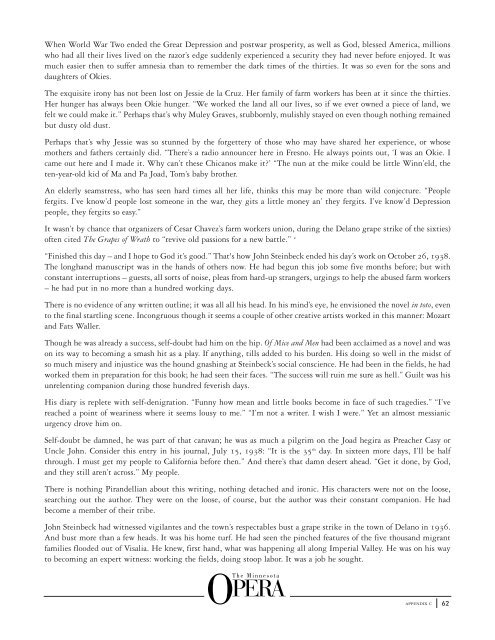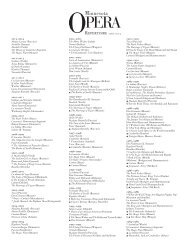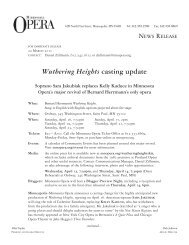You also want an ePaper? Increase the reach of your titles
YUMPU automatically turns print PDFs into web optimized ePapers that Google loves.
When World War Two ended the Great Depression and postwar prosperity, as well as God, blessed America, millions<br />
who had all their lives lived on the razor’s edge suddenly experienced a security they had never before enjoyed. It was<br />
much easier then to suffer amnesia than to remember the dark times of the thirties. It was so even for the sons and<br />
daughters of Okies.<br />
The exquisite irony has not been lost on Jessie de la Cruz. Her family of farm workers has been at it since the thirties.<br />
Her hunger has always been Okie hunger. “We worked the land all our lives, so if we ever owned a piece of land, we<br />
felt we could make it.” Perhaps that’s why Muley Graves, stubbornly, mulishly stayed on even though nothing remained<br />
but dusty old dust.<br />
Perhaps that’s why Jessie was so stunned by the forgettery of those who may have shared her experience, or whose<br />
mothers and fathers certainly did. “There’s a radio announcer here in Fresno. He always points out, ‘I was an Okie. I<br />
came out here and I made it. Why can’t these Chicanos make it?’ “The nun at the mike could be little Winn’eld, the<br />
ten-year-old kid of Ma and Pa Joad, Tom’s baby brother.<br />
An elderly seamstress, who has seen hard times all her life, thinks this may be more than wild conjecture. “People<br />
fergits. I’ve know’d people lost someone in the war, they gits a little money an’ they fergits. I’ve know’d Depression<br />
people, they fergits so easy.”<br />
It wasn’t by chance that organizers of Cesar Chavez’s farm workers union, during the Delano grape strike of the sixties)<br />
often cited The <strong>Grapes</strong> of Wrath to “revive old passions for a new battle.” 2<br />
“Finished this day – and I hope to God it’s good.” That's how John Steinbeck ended his day’s work on October 26, 1938.<br />
The longhand manuscript was in the hands of others now. He had begun this job some five months before; but with<br />
constant interruptions – guests, all sorts of noise, pleas from hard-up strangers, urgings to help the abused farm workers<br />
– he had put in no more than a hundred working days.<br />
There is no evidence of any written outline; it was all all his head. In his mind’s eye, he envisioned the novel in toto, even<br />
to the final startling scene. Incongruous though it seems a couple of other creative artists worked in this manner: Mozart<br />
and Fats Waller.<br />
Though he was already a success, self-doubt had him on the hip. Of Mice and Men had been acclaimed as a novel and was<br />
on its way to becoming a smash hit as a play. If anything, tills added to his burden. His doing so well in the midst of<br />
so much misery and injustice was the hound gnashing at Steinbeck’s social conscience. He had been in the fields, he had<br />
worked them in preparation for this book; he had seen their faces. “The success will ruin me sure as hell.” Guilt was his<br />
unrelenting companion during those hundred feverish days.<br />
His diary is replete with self-denigration. “Funny how mean and little books become in face of such tragedies.” “I’ve<br />
reached a point of weariness where it seems lousy to me.” “I’m not a writer. I wish I were.” Yet an almost messianic<br />
urgency drove him on.<br />
Self-doubt be damned, he was part of that caravan; he was as much a pilgrim on the Joad hegira as Preacher Casy or<br />
Uncle John. Consider this entry in his journal, July 15, 1938: “It is the 35 th day. In sixteen more days, I’ll be half<br />
through. I must get my people to California before then.” And there’s that damn desert ahead. “Get it done, by God,<br />
and they still aren’t across.” My people.<br />
There is nothing Pirandellian about this writing, nothing detached and ironic. His characters were not on the loose,<br />
searching out the author. They were on the loose, of course, but the author was their constant companion. He had<br />
become a member of their tribe.<br />
John Steinbeck had witnessed vigilantes and the town’s respectables bust a grape strike in the town of Delano in 1936.<br />
And bust more than a few heads. It was his home turf. He had seen the pinched features of the five thousand migrant<br />
families flooded out of Visalia. He knew, first hand, what was happening all along Imperial Valley. He was on his way<br />
to becoming an expert witness: working the fields, doing stoop labor. It was a job he sought.<br />
appendix c<br />
62








